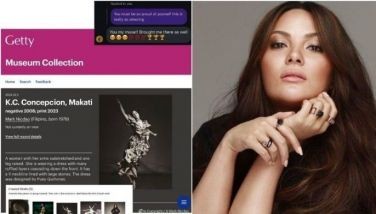Another (closer) look at Hitler
November 9, 2003 | 12:00am
He was the "Fuhrer" of the German race which he insisted was "the superior, master race."
From being a World War I corporal (tucking the coveted Iron Cross First Class Award for bravery under his belt), Adolf Hitler rose to become the leader of Germany’s National Socialistiche Deutsche Arbeiterpartei or the Nazis as they came to be known. Later he became Germany’s Chancellor.
Even then, Hitler’s domineering bent was obvious. His hatred of the Jews led to the murder of millions. With this genocide, the Austrian-born Hitler forever changed the course of world history.
Given such a compelling character and the impact his warped personality had on mankind, Hitler’s life story will always provide a "good plot" for filmmakers to interpret.
"A plot must be very good," a drama teacher once said. "It is the unifying pattern that connects various incidents, whether character- or circumstance-driven. As compared to painting, it is the rendering that produces movements and actions."
A life story like Hitler’s is guaranteed to provide a plot that can give anyone goose-bumps – and raise innumerable questions just as it can create innumerable controversies.
HBO-Asia, through CINEMAX is premiering at 9 tonight the four-hour mini-series, Hitler: The Rise of Evil.
This writer asked Peter Sussman, executive producer of Hitler: The Rise of Evil and CEO of Entertainment Group of Alliance Atlantis Communications, Inc., what motivated him and his team to present Hitler’s biography (the mini-series covers Hitler’s saga from when he was 10 to just before World War II), Peter replied, "The story is compelling, I can’t resist (it). So far, nobody in dramatic film/documentary had gone back to the beginning of how Adolf Hitler ever got into power. Like the historical movies we’ve done, Hitler was made to educate people and to advance a cause."
With this main thrust, Hitler is at once a character study besides being a bio-epic presentation.
Hitler shows the Fuhrer’s formative years, focusing on how his beloved mother’s death and his father’s short temper and abuse affected him. It also reveals Hitler’s first ambition in life – to become an artist. The mini-series also presents his relationship with his niece, who tragically committed suicide.
Hitler reveals how Hitler rose from the ranks, showing off his skills in journalism, public speaking and propaganda which resulted to the Nazi party’s popularity and rise in power.
For authenticity, Peter Sussman and his team meticulously gathered facts and consulted professionals.
"In my team, I had some of the respected historians and educators in the arena," Peter said with pride. "They come from the best universities in the world. We had to be careful in the inputs we put in the movie. That’s why we got people with the right knowledge. In the case people will ask, we can show them that this what our research says. Or they can talk to so and so from Harvard or from (some other) school. So we are quite comfortable with the factual information the film presents."
Peter Sussman, also the executive producer of the mini-series Joan of Arc (starring Leelee Sobieski), Nuremberg (Alec Baldwin) and Life with Judy Garland, considers making Hitler quite difficult compared to other documentaries or TV presentations he has done for the last 17 years. This is because of the main character’s controversial personality.
"It wasn’t that different or difficult," Peter said. "Many of the mini-series we’ve done have also been historical stories. So in some ways, Hitler had all the same challenges like being accurate and true to the history of the story, the nature of the character(s) and the look of the film. If there’s one thing that distinguishes Hitler, it would be the level of controversy around the film."
So how did Peter deal with it?
"Initially, I was absorbing the various negative comments that have been made by a lot of people, especially those who haven’t seen it," he replied. "They were just making comments, I guess, because of the fear of us – (despite) our best intention – making a mistake in this film. They were sending signals not to glorify Hitler. So, all I could do was to take criticisms, inquiries and to hang with them until the film was made."
To ensure the authenticity of facts, and to make sure the artistic treatment would not distort the message of the film in any way, Peter kept on tracking the critics’ views and tried to absorb their views. When filming started and there were available cuts or rushes of the film, Peter took another step.
"I started to go out and consult the relevant, respected senior members of the community who have knowledge about the era," he said. "One by one, I showed the film and talked to them. But again, we knew the subject would be looked out very closely."
More than having a historical "refresher course," audiences will learn a lot more about Hitler for it focuses on how he came to be.
"Hitler is interpreted as wayward and not a very impressive individual," described Peter. "He came from a bad childhood. (He was) someone who was finding progressive momentum in his life, finding a good reason for living until he became part of the German Army."
If this Hitler’s story has a new twist/focus, how the audience will find it?
"They will find answers to their assumptions on how Hitler came into power," Peter replied. "This is true because people I know who watched the film have become more informed after watching it."
Hitler: The Rise of Evil is helmed by Christian Duguay who inspired the stars of the mini-series. Leading the powerhouse cast are Robert Carlyle as Adolf Hitler, Jena Malone (Hitler’s niece Geli), Julianna Margulies (Helene Hanfstaengl), Matthew Modine (newspaper reporter Fritz Gerlich), Stockard Channing (Hitler’s mother), Peter O’Toole (President von Hindenburg) and Liev Schrieber (Ernst Hanfstaengl).
Peter added that Hitler was a major project; by American TV standards, it is one of the biggest and most expensive four-hour films made in recent years. The film also attracted media attention in North America and elsewhere. Hitler was also nominated for the Emmy Awards, and received another nomination for Best TV Program, Mini-series or Special from Television Critics Awards in North America.
Robert Carlyle’s performance is crucial in Hitler. The actor never failed Peter’s expectations.
"He is a fantastic actor," Peter gushed about Robert’s acting. "We recognized from the material his (acting) ability. He is a real chameleon. He can take on different characters and personalities. He also has the basic physical attributes of Hitler. Though one can’t find the perfect match of another person, he is close enough to the man."
By viewing Hitler and pictures of Robert Carlyle, one agrees that he indeed resembles Hitler. However, it’s Robert’s expressive eyes that make the difference. Through them, Robert virtually helps us see the world the way Hitler did, conveying Adolf Hitler’s complex range of emotions.
If there’s a mark the mini-series Hitler might just like to leave in the public’s mind, what would it be?
"It will always relevant to the times," Peter said. "However, I don’t want to see any connection of it to Saddam Hussein in Iraq or to Osama Bin Laden. People can only point coincidences in any point in history.
"If there’s any message this film could give, that is how fragile democracy is... (that) it can fall to the wrong hands or might be misdirected."
From being a World War I corporal (tucking the coveted Iron Cross First Class Award for bravery under his belt), Adolf Hitler rose to become the leader of Germany’s National Socialistiche Deutsche Arbeiterpartei or the Nazis as they came to be known. Later he became Germany’s Chancellor.
Even then, Hitler’s domineering bent was obvious. His hatred of the Jews led to the murder of millions. With this genocide, the Austrian-born Hitler forever changed the course of world history.
Given such a compelling character and the impact his warped personality had on mankind, Hitler’s life story will always provide a "good plot" for filmmakers to interpret.
"A plot must be very good," a drama teacher once said. "It is the unifying pattern that connects various incidents, whether character- or circumstance-driven. As compared to painting, it is the rendering that produces movements and actions."
A life story like Hitler’s is guaranteed to provide a plot that can give anyone goose-bumps – and raise innumerable questions just as it can create innumerable controversies.
HBO-Asia, through CINEMAX is premiering at 9 tonight the four-hour mini-series, Hitler: The Rise of Evil.
This writer asked Peter Sussman, executive producer of Hitler: The Rise of Evil and CEO of Entertainment Group of Alliance Atlantis Communications, Inc., what motivated him and his team to present Hitler’s biography (the mini-series covers Hitler’s saga from when he was 10 to just before World War II), Peter replied, "The story is compelling, I can’t resist (it). So far, nobody in dramatic film/documentary had gone back to the beginning of how Adolf Hitler ever got into power. Like the historical movies we’ve done, Hitler was made to educate people and to advance a cause."
With this main thrust, Hitler is at once a character study besides being a bio-epic presentation.
Hitler shows the Fuhrer’s formative years, focusing on how his beloved mother’s death and his father’s short temper and abuse affected him. It also reveals Hitler’s first ambition in life – to become an artist. The mini-series also presents his relationship with his niece, who tragically committed suicide.
Hitler reveals how Hitler rose from the ranks, showing off his skills in journalism, public speaking and propaganda which resulted to the Nazi party’s popularity and rise in power.
For authenticity, Peter Sussman and his team meticulously gathered facts and consulted professionals.
"In my team, I had some of the respected historians and educators in the arena," Peter said with pride. "They come from the best universities in the world. We had to be careful in the inputs we put in the movie. That’s why we got people with the right knowledge. In the case people will ask, we can show them that this what our research says. Or they can talk to so and so from Harvard or from (some other) school. So we are quite comfortable with the factual information the film presents."
Peter Sussman, also the executive producer of the mini-series Joan of Arc (starring Leelee Sobieski), Nuremberg (Alec Baldwin) and Life with Judy Garland, considers making Hitler quite difficult compared to other documentaries or TV presentations he has done for the last 17 years. This is because of the main character’s controversial personality.
"It wasn’t that different or difficult," Peter said. "Many of the mini-series we’ve done have also been historical stories. So in some ways, Hitler had all the same challenges like being accurate and true to the history of the story, the nature of the character(s) and the look of the film. If there’s one thing that distinguishes Hitler, it would be the level of controversy around the film."
So how did Peter deal with it?
"Initially, I was absorbing the various negative comments that have been made by a lot of people, especially those who haven’t seen it," he replied. "They were just making comments, I guess, because of the fear of us – (despite) our best intention – making a mistake in this film. They were sending signals not to glorify Hitler. So, all I could do was to take criticisms, inquiries and to hang with them until the film was made."
To ensure the authenticity of facts, and to make sure the artistic treatment would not distort the message of the film in any way, Peter kept on tracking the critics’ views and tried to absorb their views. When filming started and there were available cuts or rushes of the film, Peter took another step.
"I started to go out and consult the relevant, respected senior members of the community who have knowledge about the era," he said. "One by one, I showed the film and talked to them. But again, we knew the subject would be looked out very closely."
More than having a historical "refresher course," audiences will learn a lot more about Hitler for it focuses on how he came to be.
"Hitler is interpreted as wayward and not a very impressive individual," described Peter. "He came from a bad childhood. (He was) someone who was finding progressive momentum in his life, finding a good reason for living until he became part of the German Army."
If this Hitler’s story has a new twist/focus, how the audience will find it?
"They will find answers to their assumptions on how Hitler came into power," Peter replied. "This is true because people I know who watched the film have become more informed after watching it."
Hitler: The Rise of Evil is helmed by Christian Duguay who inspired the stars of the mini-series. Leading the powerhouse cast are Robert Carlyle as Adolf Hitler, Jena Malone (Hitler’s niece Geli), Julianna Margulies (Helene Hanfstaengl), Matthew Modine (newspaper reporter Fritz Gerlich), Stockard Channing (Hitler’s mother), Peter O’Toole (President von Hindenburg) and Liev Schrieber (Ernst Hanfstaengl).
Peter added that Hitler was a major project; by American TV standards, it is one of the biggest and most expensive four-hour films made in recent years. The film also attracted media attention in North America and elsewhere. Hitler was also nominated for the Emmy Awards, and received another nomination for Best TV Program, Mini-series or Special from Television Critics Awards in North America.
Robert Carlyle’s performance is crucial in Hitler. The actor never failed Peter’s expectations.
"He is a fantastic actor," Peter gushed about Robert’s acting. "We recognized from the material his (acting) ability. He is a real chameleon. He can take on different characters and personalities. He also has the basic physical attributes of Hitler. Though one can’t find the perfect match of another person, he is close enough to the man."
By viewing Hitler and pictures of Robert Carlyle, one agrees that he indeed resembles Hitler. However, it’s Robert’s expressive eyes that make the difference. Through them, Robert virtually helps us see the world the way Hitler did, conveying Adolf Hitler’s complex range of emotions.
If there’s a mark the mini-series Hitler might just like to leave in the public’s mind, what would it be?
"It will always relevant to the times," Peter said. "However, I don’t want to see any connection of it to Saddam Hussein in Iraq or to Osama Bin Laden. People can only point coincidences in any point in history.
"If there’s any message this film could give, that is how fragile democracy is... (that) it can fall to the wrong hands or might be misdirected."
BrandSpace Articles
<
>
- Latest
- Trending
Trending
Latest
Trending
Latest
Recommended

























 Exclusive
Exclusive







